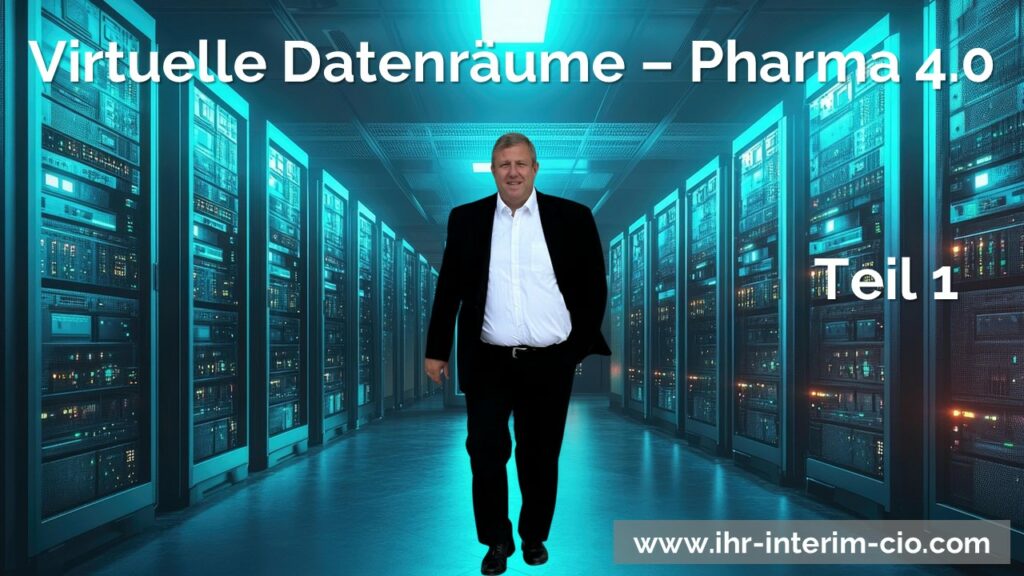
Interim CIO: Dr. Claus Michael Sattler
Data rooms: A general definition

In an increasingly digitalized world, data rooms are playing an ever more important role for companies, organizations and entire industries. But what exactly is a data room and what significance do they have for the modern economy and society? In this blog post, we take a detailed look at the concept of data rooms and their many possible applications.
What are data rooms?
A data room, often referred to as a virtual data room (VDR), is a secure online platform used to store and share confidential documents and information [source: 1]. In contrast to physical data rooms, virtual data rooms are accessible via the Internet, which enables location-independence and efficiency in document management and communication.
A more comprehensive definition describes data spaces as “federated, open infrastructures for sovereign data exchange based on common agreements, rules and standards” [source: 3]. This definition emphasizes the collaborative and standardized nature of data spaces.
Key features of data rooms
Data rooms are characterized by several important features:
- Security: Data rooms use advanced security measures such as encryption, strict access controls and activity logs to ensure the confidentiality and integrity of stored information.
- Flexibility: They enable access to data from different locations and support collaboration between different parties.
- Control: Data rooms offer granular control over access rights and editing options for individual documents or entire folder structures.
- Transparency: All activities within the data room can be tracked and logged, which is important for audits and compliance purposes.
- Interoperability: Modern data rooms are often designed to interact with different systems and platforms, which facilitates data exchange.
Areas of application for data rooms
Data rooms are used in various industries and scenarios. Here are a few examples:
1. mergers and acquisitions
In corporate transactions, data rooms serve as a secure environment for due diligence. Buyers can view confidential company documents without having to physically hand them over.
2. healthcare
In the healthcare sector, data rooms enable the secure exchange of patient data between different institutions and researchers. One example is the use of data rooms in cancer research, where aggregated patient data from different hospitals can contribute to the development of new treatment approaches [source: 2].
3. industry 4.0
In networked production, data rooms are used to exchange machine and sensor data along the entire supply chain. For example, a car manufacturer can share real-time data on production processes with its suppliers in order to identify bottlenecks more quickly and increase efficiency [source: 2].
4. energy sector
Data rooms play an important role in the management and exchange of data on consumption, generation and grid utilization in the energy industry. This is particularly relevant for the development and control of smart grids [source: 2].
5. smart cities
Cities use data spaces to securely store and exchange different types of data – from traffic and the environment to energy consumption. This enables the development of smart and sustainable urban solutions [source: 2].
Advantages of data rooms
The use of data rooms offers numerous advantages:
- Increased security: Data rooms offer a high level of data protection and security, which is particularly important for sensitive information.
- Improved collaboration: They facilitate collaboration between different parties, even across geographical borders.
- Increased efficiency: Centralized management and easy access to documents accelerate processes and make them more efficient.
- Cost savings: Virtual data rooms reduce the costs of physical document management and transportation.
- Compliance: The logging of all activities supports compliance with regulatory requirements.
Challenges in the implementation of data rooms
Despite their advantages, companies face a number of challenges when implementing data rooms:
- Data security: Ensuring the security of sensitive data remains a constant challenge.
- Interoperability: The integration of different systems and data formats can be complex.
- Regulatory requirements: Data rooms often have to comply with strict regulatory requirements, especially in sectors such as healthcare or the financial industry.
- User acceptance: The introduction of new systems can meet with resistance from employees who are used to traditional working methods.
The future of data rooms
The importance of data rooms will continue to grow in the future. Trends such as artificial intelligence, the Internet of Things and big data will drive the development of even more powerful and intelligent data spaces. At the same time, topics such as data sovereignty and ethical data use will become increasingly important.
An interesting trend is the development of networked data spaces or “data space mesh”. This concept allows different data spaces from different domains to interact with each other and exchange data while retaining control and sovereignty over their own data [source: 6].
Conclusion
Data rooms are more than just secure storage locations for documents. They are complex, federated infrastructures that enable the sovereign and efficient exchange of data. In an increasingly data-driven world, they are becoming an indispensable tool for companies and organizations in all sectors.
The successful implementation and use of data rooms requires not only technical know-how, but also a deep understanding of the specific requirements and challenges of the respective industry. This is where experienced experts can make a valuable contribution.
As an experienced interim CIO, I, Dr Claus Michael Sattler, specialize in supporting companies in the implementation and optimization of data rooms. With my expertise, I can help your organization take full advantage of this technology and overcome the challenges associated with it. Contact me today at www.ihr-interim-cio.com to find out how we can work together to prepare your business for the data-driven future.
Sources
- https://www.ftapi.com/glossar/datenraum/
- https://www.d-velop.de/blog/compliance/datenraeume/
- https://gaia-x-hub.de/wp-content/uploads/2022/10/20220914_White_Paper_22.1_Definition_Datenraum_final.pdf
- https://datenraume.de
- https://www.rechenzentrumreinigung.eu/was-ist-ein-datenraum-data-room.html
- https://mobility-dataspace.eu/fileadmin/05_presse_medien/230904_factsheet_datenraeume.pdf
- https://de.wikipedia.org/wiki/Datenraum
- https://teamdrive.com/blog-de/was-ist-ein-virtueller-datenraum/